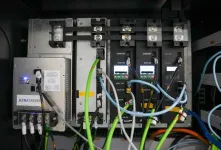(Press-News.org) Resting brain stem cells hardly differ from normal astrocytes, which support the nerve cells in the brain. How can almost identical cells perform such different functions? The key lies in the methylation of their genetic material, which endowes these special astrocytes with stem cell properties. Scientists from the German Cancer Research Center (DKFZ) and Heidelberg University have published their findings in the journal Nature. In mice, the researchers showed that experimentally induced lack of blood supply in the brain epigenetically reprograms astrocytes into brain stem cells, which in turn can give rise to nerve progenitor cells. This discovery shows that astrocytes could potentially be used in regenerative medicine to replace damaged nerve cells.
Many different types of cells work together in the brain. In humans, nerve cells (neurons) make up less than half of the cells. The rest are called “glia”. The most common glial cells are astrocytes. They supply the neurons with nutrients, form part of the blood-brain barrier, regulate the synapses and support the immune cells.
However, a small proportion of astrocytes are able to produce nerve cells and other types of brain cells. These special astrocytes are therefore also known as brain stem cells. Brain stem cells and ordinary astrocytes hardly differ in their gene expression, i.e. in the activity of their genes. “How they can perform such different functions and what makes up the stem cell properties was previously completely unclear,” explains Ana Martin-Villalba, stem cell researcher at the DKFZ.
Methylation is the key
To solve this puzzle, the teams led by Martin-Villalba and Simon Anders (University of Heidelberg) isolated both ordinary astrocytes and brain stem cells from one of the regions of the brain where young neurons still develop in adult mice, the “ventricular-subventricular zone” (vSVZ). The researchers analyzed gene expression at the level of individual cells using mRNA sequencing as well as the patterns of methylation (“methylome”) in the entire genome. They used a specially developed tool to analyze the methylation data*.
DNA methylation refers to chemical “markers” with which the cell can switch off unused parts of its DNA. Methylation is therefore crucial for the identity of the cells.
During this study, the stem cell experts noticed that brain stem cells have a special DNA methylation pattern that distinguishes them from other astrocytes. “Unlike normal astrocytes, certain genes are demethylated in brain stem cells that are otherwise only used by nerve precursor cells. This allows the brain stem cells to activate these genes in order to produce nerve cells themselves,” explains Lukas Kremer, first author of the current publication. Co-first author Santiago Cerrizuela adds: “This pathway is denied to ordinary astrocytes, as the required genes are blocked by DNA methylation.”
Lack of blood supply triggers reprogramming of astrocytes to stem cells and increases new nerve formation
Could methylation also be used to convert astrocytes into brain stem cells in other regions of the brain, outside the vSVZ? “This would be an important step for regenerative medicine to repair damaged areas of the brain,” says Ana Martin-Villalba.
Earlier studies had already shown that a lack of blood supply, such as occurs in brain injuries or stroke, increases the number of newborn nerve cells. Do altered methylation profiles play a role in this process?
To investigate this, the researchers interrupted the blood supply to the brain of mice for a short time. As a result, astrocytes with the typical stem cell methylation profile could be detected even outside the vSVZ, as well as an increased number of nerve progenitor cells.
“Our theory is that normal astrocytes in the healthy brain do not form nerve cells because their methylation pattern prevents them from doing so,” explains study head Martin-Villalba. “Techniques to specifically alter the methylation profile could represent a new therapeutic approach to generate new neurons and treat nerve diseases.”
“The lack of blood supply apparently causes astrocytes in certain areas of the brain to redistribute the methyl marks on their DNA in such a way that their stem cell program becomes accessible. The reprogrammed cells then begin to divide and form precursors for new neurons,” summarizes Simon Anders and adds: ”If we understand these processes better, we may be able to specifically stimulate the formation of new neurons in the future. For example, after a stroke, we could strengthen the brain's self-healing powers, so that the damage can be repaired”.
Why studies on mice are necessary for this research
Strokes or accidents can lead to damage to the brain that is generally irreparable at present and often has dramatic consequences for those affected. As of today, there is no way to replace lost nerve cells. The aim of this work is to find ways to stimulate the regeneration of nerves in the adult brain.
This requires a profound understanding of how and under what circumstances brain stem cells can be induced to provide a supply of young nerve cells. To do this, the researchers need to study developmental processes that only take place in the brains of highly developed mammals. Epigenetic reprogramming cannot be observed in living animals using imaging techniques, but requires studies at the level of individual cells. The investigations cannot be carried out on cells from the culture dish, as the methylation profile of the astrocytes changes as soon as they are taken into culture, so that the epigenetic reprogramming can no longer be traced.
Lukas PM Kremer, Santiago Cerrizuela, Hadil El-Sammak, Mohammad E Al Shukairi, Tobias Ellinger, Jannes Straub, Aylin Korkmaz, Katrin Volk, Jan Brunken, Susanne Kleber, Simon Anders, Ana Martin-Villalba: DNA methylation controls stemness of astrocytes in health and ischemia.
Nature 2024, DOI: 10.1038/s41586-024-07898-9
* Lukas PM Kremer, Martina M Braun, Svetlana Ovchinnikova, Leonie Küchenhoff, Santiago Cerrizuela, Ana Martin-Villalba, Simon Anders: Analyzing single-cell bisulfite sequencing data with MethSCAn.
Nature Methods 2024, DOI: 10.1038/s41592-024-02347-x
With more than 3,000 employees, the German Cancer Research Center (Deutsches Krebsforschungszentrum, DKFZ) is Germany’s largest biomedical research institute. DKFZ scientists identify cancer risk factors, investigate how cancer progresses and develop new cancer prevention strategies. They are also developing new methods to diagnose tumors more precisely and treat cancer patients more successfully. The DKFZ's Cancer Information Service (KID) provides patients, interested citizens and experts with individual answers to questions relating to cancer.
To transfer promising approaches from cancer research to the clinic and thus improve the prognosis of cancer patients, the DKFZ cooperates with excellent research institutions and university hospitals throughout Germany:
National Center for Tumor Diseases (NCT, 6 sites)
German Cancer Consortium (DKTK, 8 sites)
Hopp Children's Cancer Center (KiTZ) Heidelberg
Helmholtz Institute for Translational Oncology (HI-TRON Mainz) - A Helmholtz Institute of the DKFZ
DKFZ-Hector Cancer Institute at the University Medical Center Mannheim
National Cancer Prevention Center (jointly with German Cancer Aid)
The DKFZ is 90 percent financed by the Federal Ministry of Education and Research and 10 percent by the state of Baden-Württemberg. The DKFZ is a member of the Helmholtz Association of German Research Centers.
END
Epigenetic changes reprogram astrocytes into brain stem cells
2024-09-04
ELSE PRESS RELEASES FROM THIS DATE:
Sex hormones modulate the immune system to influence disease risk differently
2024-09-04
Researchers have uncovered how hormones profoundly affect our immune systems, explaining why men and women are affected by diseases differently.
Scientists from the Karolinska Institutet in Sweden and Imperial College London have shown for the first time which aspects of our immune systems are regulated by sex hormones, and the impacts this has on disease risk and health outcomes in males and females.
It is well established that diseases can affect men and women differently, due to subtle differences ...
Researchers identify mechanism underlying allergic itching, and show it can be blocked
2024-09-04
Why do some people feel itchy after a mosquito bite or exposure to an allergen like dust or pollen, while others do not? A new study has pinpointed the reason for these differences, finding the pathway by which immune and nerve cells interact and lead to itching. The researchers, led by allergy and immunology specialists at Massachusetts General Hospital, a founding member of the Mass General Brigham healthcare system, then blocked this pathway in preclinical studies, suggesting a new treatment approach for allergies. The findings are published in Nature.
“Our research provides ...
Brain scanning approach shows wiring of depression
2024-09-04
By repeatedly scanning the brains of a small group of patients for a year and a half, Weill Cornell Medicine researchers have identified a distinct pattern of neuronal interactions that appears to predispose some people to developing depression.
Published Sept. 4 in Nature, the work highlights the potential of a new “deep scanning” approach to help predict a person’s susceptibility to depression and other neuropsychiatric conditions and may guide the development of novel treatments.
Neuroscientists have long relied on functional magnetic resonance imaging (fMRI) to identify patterns of activity ...
Heart drug improved exercise tolerance in clinical trial of patients with hypertrophic obstructive cardiomyopathy
2024-09-04
Exercise intolerance is often severe among patients with cardiovascular disease and can impose significant limitations on their physical abilities and quality of life. Medications known as cardiac myosin inhibitors (CMIs) are being developed to help patients with hypertrophic obstructive cardiomyopathy (HOCM), a disease in which the heart muscle becomes thickened leading to reduced blood flow out of the heart. In a new analysis led by researchers from Mass General Brigham, investigators probed multiple exercise response ...
Menstrual cycle influences the spread of mutant cells in mammary tissue
2024-09-04
Leuven/Amsterdam/Cambridge, 5 September– A team of researchers at the VIB-KU Leuven Center for Cancer Biology, the Netherlands Cancer Institute and Oncode Institute and the University of Cambridge have discovered that a defensive mechanism connected to the menstrual cycle plays a role in spreading mutant cells within mammary tissue. A new study published in Nature describes how the growth and subsequent removal of extra milk ducts in breast tissue during the menstrual cycle can contribute to the spread of mutant cells leading to large mutant fields prone to develop tumors.
Although tissue in healthy individuals may look completely normal, ...
Study shows how oceans are key to addressing global challenges
2024-09-04
New research shows how oceans can be used to help address major challenges such as the shortage of antimicrobial medicines, solutions for plastic pollution and novel enzymes for genome editing.
In the past 20 years, scientists have greatly increased the number of microbial genomes they have collected from the ocean. However, using this information for biotechnology and medicine has been difficult.
For this new study, led by BGI Research in China in collaboration with the Shandong University, Xiamen University, ...
Immune cells prevent lung healing after viral infection
2024-09-04
Investigators involved in a multicenter study co-led by Cedars-Sinai discovered a pathway by which immune cells prevent the lungs’ protective barrier from healing after viral infections like COVID-19. The findings, published in Nature may lead to new therapeutic treatment options.
The COVID-19 pandemic revealed how viral infections can cause long-lasting effects—a condition called long COVID. Also known as post-acute sequelae of SARS-CoV-2, long COVID has left a devastating trail of people who continue to live with ...
KERI overcomes from overseas dependence on drive system technology for machine tools!
2024-09-04
Korea Electrotechnology Research Institute (KERI) has succeeded in domestically developing the ‘CNC driving system’ technology, a core component of machine tools—often referred to as "Mother Machines," the machines that make other machines.
The CNC (Computer Numerical Control) system is an electronic module that processes numerical information via a computer and automatically controls all functions of machine tools, including position, speed, and rotation of a machine tool. In a computer, it plays a role similar to that of a CPU.
A major challenge ...
Digital Science unveils Papers Pro: Revolutionizing scholarly research with advanced AI-powered features
2024-09-04
Digital Science today announces the launch of Papers Pro, an AI-enhanced premium version of its acclaimed reference manager, Papers.
As part of the ReadCube suite of literature solutions, Papers Pro is designed to make researchers and students more productive in their daily tasks by integrating cutting-edge AI tools to transform how they discover, organize, read, annotate, share and cite research materials.
Search and discovery has always been a core part of the Papers workflow. The launch of Papers Pro introduces new search capabilities, powered by Dimensions, one of the world’s largest ...
PCORI offers up to $100 million for new research promoting healthy children and youth
2024-09-04
Sept. 4, 2024
WASHINGTON, D.C. – The Patient-Centered Outcomes Research Institute (PCORI) today began inviting proposals through eight new funding opportunities, including three PCORI Funding Announcements (PFAs) for patient-centered comparative clinical effectiveness research (CER). One PFA is offering up to $100 million to support CER studies promoting healthy children and youth, a demographic representing more than a third of the U.S. population and facing a range of mental and physical health challenges.
“These ...


